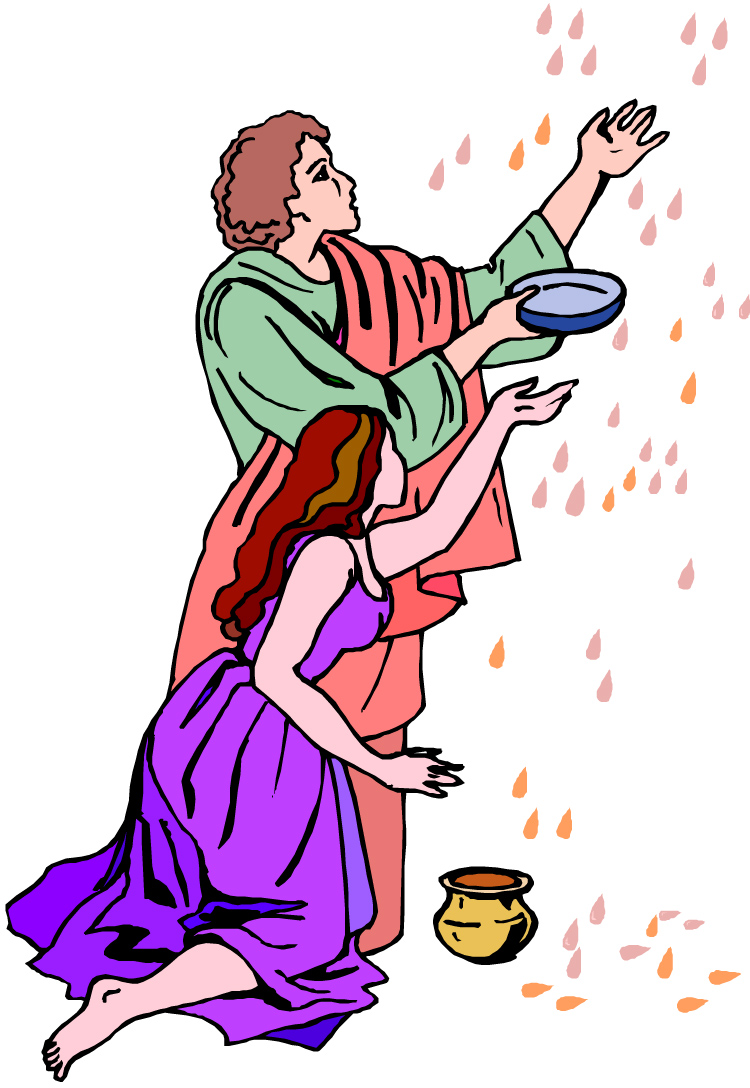
Exodus 32:4–5, Your gods…a feast to YHVH. This is the first example in the Scriptures of YHVH’s peoplemixing pagan practices (i.e. evil) with the truth of Elohim (i.e. good). We see that Satan the deceiving serpent was the first entity to defile good with evil when he questioned Elohim and tempted the first humans (Gen 2:9 cp. 3:1–6). The Hebrew word babel or Babylon means “confusion or mixture.” It is the mixing of evil with good, error with truth, darkness with light, death with life. In the end times, the saints must first recognize such mixture by knowing the difference between the holy and the profane and then be able to separate the two, and then come away from that which is evil or part of Babylon (Exek 22:26; 44:23; Rev 18:4; 2 Cor 6:14–17.) Though mainstream Christianity and Judaism are biblically-based religious systems, both have allowed pagan traditions, celebrations belief systems to insinuate themselves into their religious practices. In these end times, YHVH is calling his people away from everything that is unholy and unbiblical (Rev 18:4).
Exodus 32:5, A feast. Hebrew chag meaning “festival, feast, festival-gathering, pilgrim-feast or a festival sacrifice.” In the Torah (e.g. Lev 23; Deut 16:16), only three of the seven biblical holidays are referred to as a chag. They are the pilgrimage festivals (e.g. Ps 42:4) called the Feast of Unleavened Bread, the Feast of Weeks or Harvest of First Fruits, and the Feast of Tabernacles or Ingathering. Chag can also refer to a pagan festival as is the case in Exod 32:5 at the golden calf, or to the feast instituted by Jeroboam I to replace the Feast of Tabernacles (1 Kgs 12:32–33; The TWOT).
The verb chaggag, the root of chag, means “to hold a feast, hold a festival, make pilgrimage, keep a pilgrim-feast, celebrate, dance, stagger, to keep a pilgrim-feast, to reel.” Chagag primarily refers to celebrating the three biblical pilgrimage feasts, but can also refer to a pagan festival (1 Sam 30:16), or to sailers reeling to and fro on a ship as if drunk (Ps 107:27; ibid.).
Now let’s discuss the feast or chag that the Israelites made in honor of the gold calf. There is a strong likelihood that the day the Israelites dedicated to the worship of the golden calf was on the weekly Sabbath. The reasons to believe it was the Shabbat are as follows. Let us first assume that the Israelites received the ten commandments on Shavuot, which many of us believe was on a Sunday (i.e. 50 days after the morrow or day of the weekly Shabbat; see Lev 23:15–16). The next day—a Monday—(Exod 24:4), Moses built an altar and ratified the covenant with the Israelites (vv. 4–8). After that, Moses celebrated with the elders at the base of Mount Sinai (vv. 9–11). Next, Moses went up onto Mount Sinai to receive the tablets of stone (vv. 12–15). It had been six days since the glory of YHVH had been resting on the mountain (from Sunday to Saturday). On the seventh day or the weekly Shabbat, YHVH called Moses to enter the glory cloud where he remained with YHVH until his descent from Sinai. Moses was on the mountain from sometime Monday until Shabbat, when he entered the glory cloud. All total, Moses was on the mountain for forty days (vv. 16–18). At the end of 40 days, YHVH informed Moses of the people’s sin (Exod 32:7). If Moses ascended the mountain sometime on Monday, then the same time on Tuesday would have been day one. Forty days later was the weekly Shabbat. Moses descended the mountain after YHVH informed him of the people’s sin, and after forty days. This means that Moses descended on a Sunday. This also means that the people made a pagan feast to the golden calf on the Shabbat. Although the Bible never calls the Shabbat a chag, nevertheless, as we have seen above, the Bible refers to pagan celebrations as a chag. This is because pagan festivals were not solemn, but were often raucous, lewd, bacchanalian events—hence the term chag to indicate the festive nature of the event, though in a pejorative way.
Exodus 32:6, Play. Heb. tsachaq means “to laugh, mock, play, to laugh, to jest, to sport, make sport, toy with, make a toy of.” In this verse, the verb tsachaq is in its piel (intensive active form) and means “to jest, to sport, play, make sport, toy with, make a toy of” (The TWOT). If the Israelite’s festival dedicated to worship of the golden calf was on the weekly Shabbat (see notes above on v. 5), then YHVH’s displeasure against the Israelites was not only for their idolatry, but for their profaning his holy Sabbath by using it as a time for partying and for carnal sporting activities. They were mocking, making light of, toying with YHVH’s Shabbat, and were seeking their own sensual and carnal, if not, illicit pleasures on his day! This something that Scripture forbids (see Isa 58:13; 56:6).

Some reading this will justify themselves for their profaning the Sabbath by doing “their own pleasure” on that day as having nothing to do with golden calf worship. In reality, the golden calf was a form of or metaphor for Baal or self-worship—i.e., doing our own will or pleasure over that of Elohim’s. Make no mistake about it folks, this is the biblical definition of idolatry!
The Word of Elohim must be the final determiner of what we do or don’t do when it comes to our walk of righteousness—not our own carnal feelings and desires, which are heavily influenced by our fallen, carnal natures as well as the influence of the world and the devil and are thus antithetical to and rebellious against the will and Word of Elohim. It is the Word of Elohim that will judge us. Personal excuses and self-justifications will not pass muster before the throne of the Almighty and Righteous Judge of the universe on judgment day!













